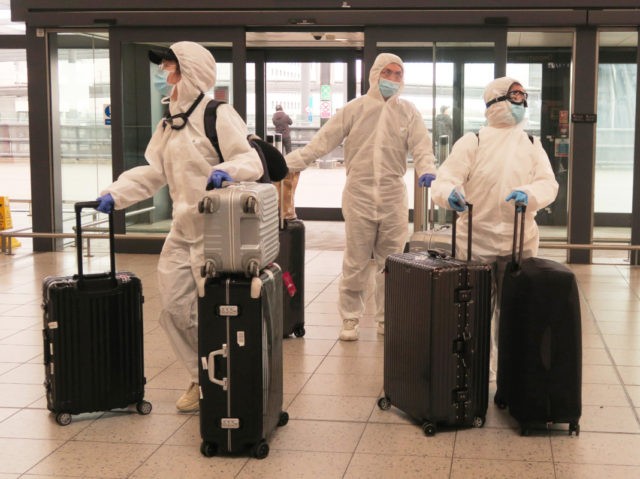Despite introducing severe lockdown on its own residents, the UK government has not enacted any incoming travel restrictions, leaving over 100,000 arrivals a week free to enter the country unscreened, the health secretary revealed.
Asked by UK television host — and self-proclaimed “friend” of U.S. President Donald Trump — Piers Morgan on how many people were being tested for coronavirus as they stepped off international flights arriving in the nation’s airports, health secretary Matt Hancock revealed there was no routine testing at Britain’s air borders going on at all.
Following up that admission with the number of people still arriving in the United Kingdom by air, despite much of the global flying industry working at minimum capacity, Mr Hancock said around 15,000 people a day were landing, reports London’s Times.
While this number is a fraction of the number of people normally arriving in the United Kingdom — Heathrow, the country’s largest airport, would typically see an aircraft land or take off every 45 seconds and 213,000 people move through it a day — it still means a significant 105,000 people coming to Britain every week without a health check.
Mr Hancock defended the no-testing policy because the number of arrivals had fallen, and called the 105,000 a week figure of new arrivals during a time of global pandemic “very very low”. He further explained that the scientific advice he had received was the benefits of closing the borders was small because there was already transmission going on within the United Kingdom, and that arrivals from some areas were treated differently, but did not elaborate.
The government pointed out on Wednesday that they had seen no evidence that border closures slowed the spread of infection.
The discrepancy between Britain’s open frontiers, with open borders and flights arriving from even some of the hardest-hit areas of the globe, and the government’s domestic repression of the British people, forbidding them to even leave their own homes except in a small number of circumstances, has drawn some criticism. Brexit Party chairman Richard Tice has called the continuing inflow of flights indefensible, while Brexit Party leader Nigel Farage has called it insane.
In earlier comments, Mr Farage drew a clear parallel between Britain being a domestically closed country, with residents confined to their homes, but while paradoxically maintaining open borders. Speaking in late March as the national closedown began, Mr Farage said: “So we are to be locked down — and a new testing regime will begin. Will the planes keep coming from Milan, Tehran, and Beijing? I expect so”, and criticised the government’s lack of joined-up thinking.
Noting that while Italy was becoming the global epicentre for coronavirus, Mr Farage said: “On the very same day that Lombardy was closed down, 17 flights came into the United Kingdom from Milan’s Malpensa airport…. [with] not a single person being temperature checked.”
The British government’s approach to the lockdown, where Britons are strictly policed but the borders are not, are something of an anomaly worldwide, a point even acknowledged by the enthusiastically pro-globalism and anti-borders Financial Times. The paper cited the remarks of epidemiologist Professor Gabriel Scally in their report, who noted: “The UK is an outlier… It is very hard to understand why it persists in having this open borders policy. It is most peculiar.”
Professor Scally said that while temperature-testing people at the airport was not a “magic bullet” because symptoms often appeared days or weeks after infection, and travel restrictions would not be effective on their own, it was still worth doing as every little action “adds up to beating the virus”.
The report claimed 130 countries had introduced travel restrictions over coronavirus, covering 90 per cent of the globe’s population, and 39 per cent of people worldwide were behind totally closed borders. The United Kingdom has pursued a radically different policy, however, merely relying on the fact comparatively few people now want to fly abroad, rather than closing borders.
The Financial Times notes this let-it-be attitude has seen a rise in the number of superyachts arriving at British ports, as they have found themselves unable to land at other European countries.
The government’s policy has left individual border guard officers fearful over the impact to the nation, as well as to their own health. Breitbart London reported on Thursday on border officers begging for testing apparatus and personal protection equipment at airports, with one saying: “We’ve got to start testing people at the airport as soon as they land. And we can easily catch the plane and just do temperature checks. We can easily do it. Just give us the equipment, and we’ll do it.
“Our job is to protect the border, and we’re not doing that.” The officer said concerns raised with superiors were “just brushed off”.

COMMENTS
Please let us know if you're having issues with commenting.